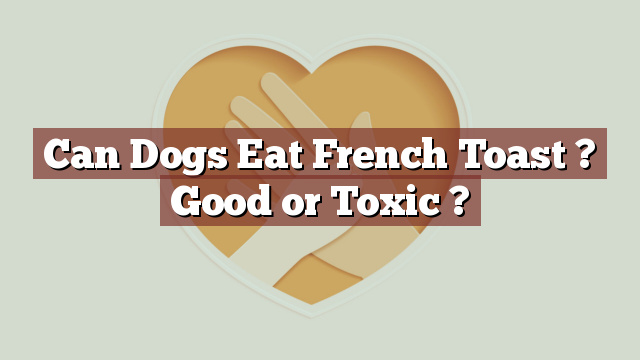Can Dogs Eat French Toast? Good or Toxic?
As responsible pet owners, it’s crucial to know which human foods are safe for our furry friends to consume. Can dogs eat French toast? Let’s find out if this beloved breakfast delicacy is suitable for our canine companions.
Nutritional Value of French Toast: What Does It Contain?
French toast is a popular breakfast dish made by soaking bread slices in a mixture of eggs, milk, and vanilla, then frying them until golden brown. It is often served with butter, syrup, or fruits on top. While French toast can be a delicious treat for humans, it’s essential to examine its nutritional components before considering sharing it with your dog.
Typically, French toast contains carbohydrates from the bread and small amounts of proteins, vitamins, and minerals from the eggs and milk. However, it is crucial to note that French toast is usually prepared with additives such as butter, syrup, or other toppings that may not be suitable for canine consumption.
Can Dogs Eat French Toast? Is It Safe or Toxic?
No, dogs should not eat French toast. Although the main ingredients of French toast are generally safe for dogs, the additional components such as butter, syrup, and toppings can be harmful. Butter and syrup are high in fat and sugar, which can lead to obesity, diabetes, and pancreatitis in dogs. Moreover, some syrups may contain xylitol, a sugar substitute that is highly toxic to dogs.
Milk, another common ingredient in French toast, can also cause digestive issues in dogs, as many canines are lactose intolerant. While small amounts of plain, unsweetened milk might be tolerated by some dogs, it’s best to avoid it altogether to prevent potential discomfort.
Potential Risks and Benefits of Feeding French Toast to Dogs
Feeding French toast to your dog can pose several risks. The high-fat content in butter and syrups can lead to weight gain, pancreatitis, and other health issues. Additionally, the sugar content in syrup and the lactose in milk can cause digestive upset and discomfort for your furry friend.
On the other hand, French toast does offer some nutritional benefits from the eggs and bread. Eggs are an excellent source of protein, and bread provides carbohydrates for energy. However, these benefits can be obtained through other, safer food choices specifically designed for dogs.
My Dog Ate French Toast, What Should I Do?
If your dog has already consumed French toast, it is best to monitor them closely for any signs of discomfort or illness. Keep an eye out for symptoms such as vomiting, diarrhea, abdominal pain, or lethargy. If you notice any concerning signs, it is crucial to contact your veterinarian immediately for guidance.
Conclusion: French Toast Can Pose Risks to Dogs, Be Cautious.
In conclusion, French toast is not a suitable food for dogs. While the main ingredients may be safe, the accompanying components such as butter, syrup, and toppings can be harmful. The high-fat and sugar content can lead to obesity, diabetes, pancreatitis, and other health issues. Additionally, some dogs may be lactose intolerant, making milk a potential digestive irritant.
When it comes to feeding our furry friends, it is essential to prioritize their health and well-being. Instead of sharing French toast, consider offering your pup dog-friendly treats or consulting with your veterinarian for appropriate dietary recommendations. By making informed choices, we can ensure our dogs lead happy, healthy lives.
Thank you for investing your time in exploring [page_title] on Can-Eat.org. Our goal is to provide readers like you with thorough and reliable information about various dietary topics. Each article, including [page_title], stems from diligent research and a passion for understanding the nuances of our food choices. We believe that knowledge is a vital step towards making informed and healthy decisions. However, while "[page_title]" sheds light on its specific topic, it's crucial to remember that everyone's body reacts differently to foods and dietary changes. What might be beneficial for one person could have different effects on another. Before you consider integrating suggestions or insights from "[page_title]" into your diet, it's always wise to consult with a nutritionist or healthcare professional. Their specialized knowledge ensures that you're making choices best suited to your individual health needs. As you navigate [page_title], be mindful of potential allergies, intolerances, or unique dietary requirements you may have. No singular article can capture the vast diversity of human health, and individualized guidance is invaluable. The content provided in [page_title] serves as a general guide. It is not, by any means, a substitute for personalized medical or nutritional advice. Your health should always be the top priority, and professional guidance is the best path forward. In your journey towards a balanced and nutritious lifestyle, we hope that [page_title] serves as a helpful stepping stone. Remember, informed decisions lead to healthier outcomes. Thank you for trusting Can-Eat.org. Continue exploring, learning, and prioritizing your health. Cheers to a well-informed and healthier future!

